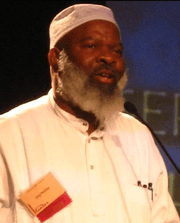Siraj Wahhaj
| Siraj Wahhaj | |
|---|---|
 | |
| Born |
Jeffrey Kearse March 11, 1950 Brooklyn, New York City New York, United States |
| Nationality | American |
| Occupation | Islamic scholar |
| Religion | Sunni Islam |
| Spouse(s) | Wadiyah Wahhaj |
| Website | |
| www.mana-net.org | |
Siraj Wahhaj (born Jeffrey Kearse, March 11, 1950) is an African-American imam of Al-Taqwa mosque in Brooklyn,[1][2] New York and the leader of The Muslim Alliance in North America (MANA).[1]
Early life
Wahhaj was born as Jeffrey Kearse and raised in Brooklyn. His mother was a nurse and his father a hospital dietitian. His brother is writer and editor Gregory S. Kearse of Silver Spring, Maryland. He went to church religiously and went on to become a Sunday school teacher as a teenager in a Baptist church.[3] Wahhaj then later went on to the New York University on a partial scholarship. He also played basketball where he met a teammate who interested him in the Nation of Islam, an African-American movement, subsequently he converted to Islam.
In 1969 he ended his schooling and joined the Nation of Islam, changing his name to Jeffrey12x.[3] During this time he was vocal in his belief that “white people are devils." He said of this, “I preached it. I taught it.”[4] Wahhaj says of his interest in the Nation: "It wasn't the theology that attracted me to the Nation of Islam at all... It was the kind of do-for-self black pride."
When Elijah Muhammed died in 1975, "His teachings began to unravel in my mind", and he became a Sunni Muslim with the encouragement of Muhammad's son Warith Deen Mohammed. Mohammed took over and reorganized the Nation of Islam, urging members to come to orthodox Islam. Kearse then changed his name again to Siraj Wahhaj, which means "bright light" in Arabic. He was chosen to study Islam at the Umm al-Qura university of Mecca for a period of four months in 1978.[4] He also briefly taught a course in Islamic studies at Howard University, where Johari Abdul-Malik is the chaplain.
Public Life
Wahhaj leads the daily prayers and performs the Friday sermon at Masjid at-Taqwa.[5] He also conducts full days of teaching in Islamic studies, Arabic and marital counselling.[5] Wahhaj is a prolific speaker in America.
In 1991 Wahhaj offered an invocation (opening prayer) to the United States House of Representatives. He was the first Muslim to do so.[1]
Activities
Anti drug movement
In 1988 he led his community in an anti-drug patrol in which they staked out drug houses in Bedford-Stuyvesant in the cold of winter for 40 days and nights, forcing the closure of 15 drug houses. This effort received high praise from the New York City Police Department and the media.
Organizational Involvement
Since that time, Wahhaj has been active in many Islamic organizations. He has been vice president of the Islamic Society of North America since 1997 and has served on the Majlis al Shura, a consultative council of Islamic scholars, since 1987. He is a member of the Board of Advisors for the American Muslim Council and has also served on the national board of the Council on American-Islamic Relations.
In 2005 Wahhaj was elected as the Amir (Chair) of Muslim Alliance in North America's Diwan (Executive committee). The Alliance was founded by scholars including Wahhaj, Zaid Shakir, Hamza Yusuf, Talib Abdur Rashid, Asim Abdur Rashid, Ihsan Bagby, R. Mukhtar Curtis, Sherman Jackson, Amir al-Islam and many others. The organization's initials stand for Muslim Alliance in North America. The organization has since held two conventions in 2007 and 2008, in which the topics of community activism, criminal justice and marriage were given great concern.
Recent speeches
Wahhaj is still the resident imam of Masjid Al- Taqwa as well as a speaker across the country. On September 5, 2009 during the "United Against Malaria" conference, he helped to raise money for people of Africa suffering from Malaria. On March 27, 2010, he gave an emotional speech about the Youth at Darul Islah Mosque, in Teaneck, New Jersey. Recently he has made a speech for The Rise Of Burma event in Princeton event on November 16, 2012
References
- ↑ 1.0 1.1 1.2 Samory Rashid, Black Muslims in the US: History, Politics, and the Struggle of a Community, p 120. ISBN 1137337516
- ↑ Michael Wolfe, Taking Back Islam: American Muslims Reclaim Their Faith, p 139. ISBN 1579549888
- ↑ 3.0 3.1 Paul M. Barrett (2007-02-16). American Islam. Washington Post. Retrieved on 2009-11-08.
- ↑ 4.0 4.1 Dulong, Jessica,The Imam of Bedford-Stuyvesant, May/June 2005, volume 56, number 3. Retrieved November 15, 2009.
- ↑ 5.0 5.1 Marci Reaven, Steve Zeitlin, Hidden New York: A Guide to Places That Matter, p 312. ISBN 0813541247
External links
- Masjid At Taqwa
- Him Promoting A Cair Fundraiser
- Muslim Alliance in North America
- Siraj Wahhaj Lectures
- ImamSWahhaj.com Official Site for CDs/DVDs by Imam Siraj
- Siraj Wahhaj's interview on Australian radio
- Imam Siraj Wahhaj on IBN MEDIA
- Guide For Humanity